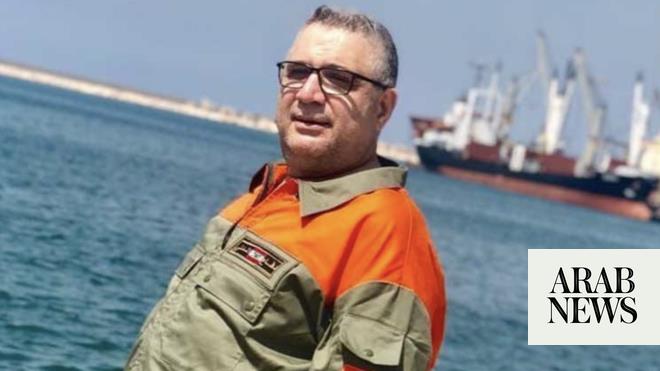
Walid Hashash was released after intervention by Lebanese minister
BEIRUT: Syrian intelligence on Friday detained Beirut’s Civil Defense chief for four hours after he crossed overland into the country en route to Egypt.
Walid Hashash, 57, director-general of the Civil Defense in the Lebanese capital, was detained and interrogated by the Palestine Branch of Syria’s intelligence service.
It is the first time such an incident has taken place since the resumption of Lebanese movement into Syria at the end of 2021.
In March 2020, the Syrian regime prevented Lebanese from entering Syria as a precautionary measure against COVID-19.
Youssef Mallah, one of the most prominent volunteers in the Civil Defense in Beirut, told Arab News that Hashash had set out on a motorcycle trip to Egypt via Jordan, passing through Syria. He was with a group of 20 friends.
He had also obtained 15 days of holiday leave for the trip, said Mallah, who added that Hashash was arrested when the group crossed a Syrian security checkpoint.
The circumstances of the arrest are unknown, but it was later suggested that it was a case of misidentification, Mallah said.
One of Hashash’s relatives, who was part of the group, informed concerned parties in Lebanon of the incident.
Reports on social media said that official contact took place with Syrian authorities to secure the release of Hashash, who was freed hours after his arrest and returned to Beirut.
Hashash’s friends said that the Beirut Civil Defense chief has no political or partisan affiliations.
The Hashash family spent hours fearfully waiting for his return amid fears that he may have been mistreated while under interrogation.
Arrests and detentions by the Palestine Branch have come under scrutiny, with the unit having links to a series of disappearances in Syrian territory since the 1980s.
Lebanese Civil Defense Director General Brig. Gen. Raymond Khattar and Caretaker Interior Minister Bassam Mawlawi handled the communication to secure Hashash’s release.
Hashash told Arab News after his return to Beirut that he is in good condition and was treated with respect by the Syrian authorities.
The head of the Sanad Party, MP Ashraf Rifi, said: “Hashash is a sportsman and has a hobby of riding motorcycles and often makes trips with the group that was accompanying him to Egypt.”
The incident comes amid growing calls for the restoration of Lebanese relations with Syria, said the MP.
“We have no details about the reasons for Hashash’s arrest. Most of the information we have indicates that he has nothing to do with politics.”
Rifi added that the Syrian regime was “still adopting the same old methods” despite the positive atmosphere prevailing in the region.
Lebanon voted to suspend Syria from the Arab League in 2011, despite Hezbollah and its allies rejecting the move.
However, as Syrian ties with countries in the region improve, Beirut has yet to take any official action to resume relations with Damascus, except for security coordination, which had been uninterrupted by the civil war.
The Amal Movement, Hezbollah’s ally, said several days ago that the resumption of Syrian membership in the Arab League is an opportunity to straighten Lebanese-Syrian relations through communication, and overcome “imaginary obstacles” to resolve several issues, most prominently the issue of Syrian refugees in Lebanon.
Meanwhile, Saudi Ambassador to Lebanon Walid Bukhari continued a political tour of the country, meeting the interior minister on Friday.
The minister described Bukhari’s mediation efforts as a catalyst for speeding up the election of a new Lebanese president.
Bukhari also met MPs of the Tajaddod bloc, among whose members is the opposition presidential candidate MP Michel Moawad.
The meeting came a day after Bukhari met Suleiman Frangieh — Hezbollah’s candidate and a close friend of Syria.
After the meeting, Moawad said that Saudi Arabia’s position had become clear. “It believes that the presidential election is a Lebanese sovereign decision and that the Lebanese must choose any path they want and therefore bear responsibility for their choice.”
The MP added: “Saudi Arabia seeks to set rules for this region on the basis of the sovereignty of states, and all the developments in the region solidify our insistence that Lebanon should not be outside this momentum, growth and stability.”
Moawad said that his bloc will confront “with all our strength, any candidate imposed by the opposition project that brought us to our current situation; the battle is between two projects, not between two people.”












